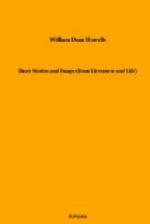In spite, however, of this almost absolute certainty of exposure, plagiarism goes on as it has always gone on; and there is no probability that it will cease as long as there are novelists, senators, divines, and journalists hard pressed for ideas which they happen not to have in mind at the time, and which they see going to waste elsewhere. Now and then it takes a more violent form and becomes a real mania, as when the plagiarist openly claims and urges his right to a well-known piece of literary property. When Mr. William Allen Butler’s famous poem of “Nothing to Wear” achieved its extraordinary popularity, a young girl declared and apparently quite believed that she had written it and lost the Ms. in an omnibus. All her friends apparently believed so, too; and the friends of the different gentlemen and ladies who claimed the authorship of “Beautiful Snow” and “Rock Me to Sleep” were ready to support them by affidavit against the real authors of those pretty worthless pieces.
From all these facts it must appear to the philosophic reader that plagiarism is not the simple “crime” or “theft” that the lexicographers would have us believe. It argues a strange and peculiar courage on the part of those who commit it or indulge it, since they are sure of having it brought home to them, for they seem to dread the exposure, though it involves no punishment outside of themselves. Why do they do it, or, having done it, why do they mind it, since the public does not? Their temerity and their timidity are things almost irreconcilable, and the whole position leaves one quite puzzled as to what one would do if one’s own plagiarisms were found out. But this is a mere question of conduct, and of infinitely less interest than that of the nature or essence of the thing itself.
PURITANISM IN AMERICAN FICTION
The question whether the fiction which gives a vivid impression of reality does truly represent the conditions studied in it, is one of those inquiries to which there is no very final answer. The most baffling fact of such fiction is that its truths are self-evident; and if you go about to prove them you are in some danger of shaking the convictions of those whom they have persuaded. It will not do to affirm anything wholesale concerning them; a hundred examples to the contrary present themselves if you know the ground, and you are left in doubt of the verity which you cannot gainsay. The most that you can do is to appeal to your own consciousness, and that is not proof to anybody else. Perhaps the best test in this difficult matter is the quality of the art which created the picture. Is it clear, simple, unaffected? Is it true to human experience generally? If it is so, then it cannot well be false to the special human experience it deals with.




